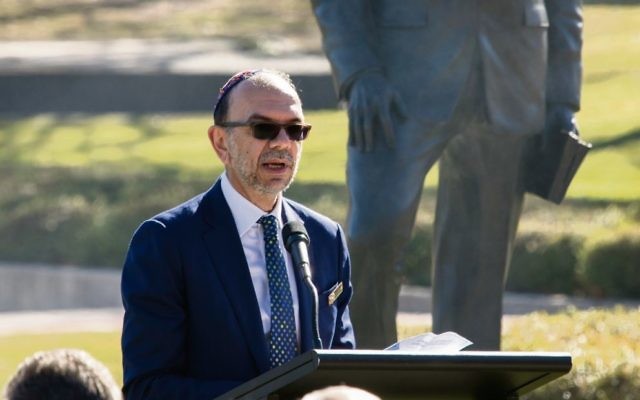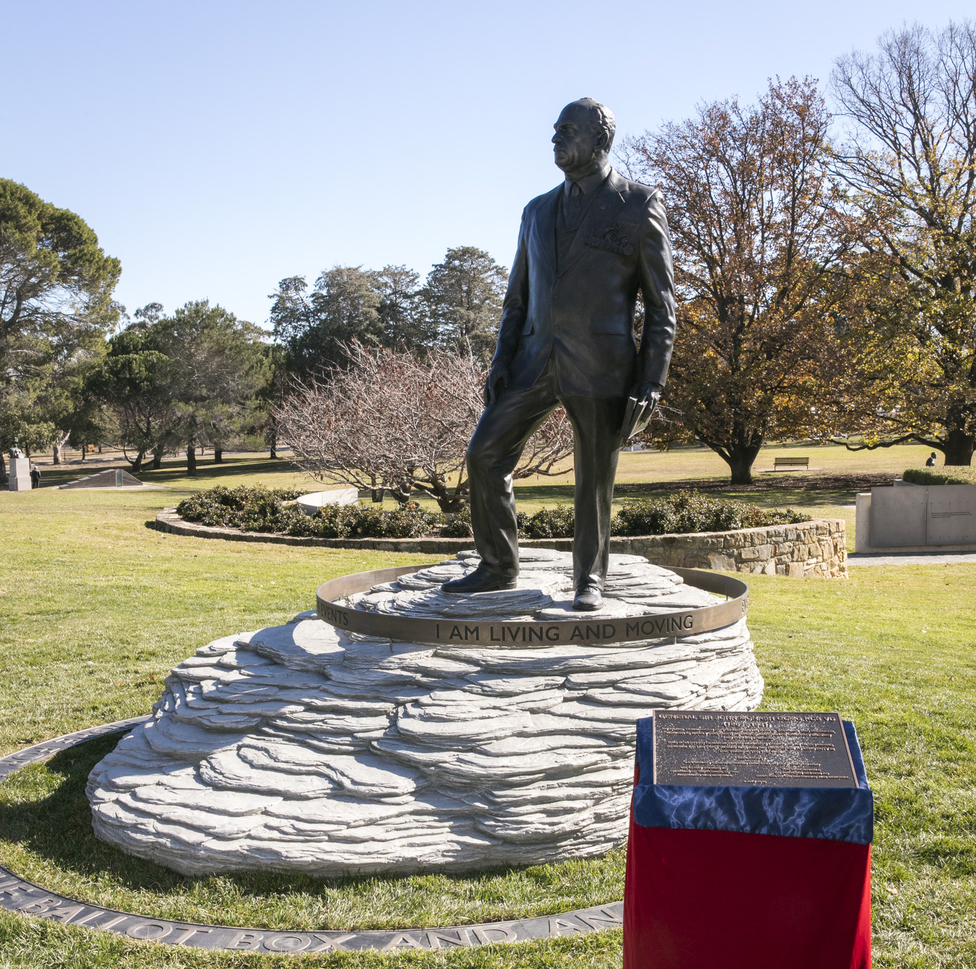Monash: An example to us all
Australian War Memorial director Dr Brendan Nelson not only focused on Monash's Jewishness, but attributed his character and leadership to his embodiment of Jewish values.

THE sculpture is striking for both its simplicity and the strength it conveys. It stands outside the Australian War Memorial in Canberra in the beautiful sculpture garden.
The garden is a place of quiet contemplation, with evocative commemorative works. Here you will find only two other sculptures of individuals, Sir Edward “Weary” Dunlop, and Simpson and his donkey, although there are several memorials to Australian servicemen and women.
On Wednesday, July 4, this new sculpture was added to the noble display. It’s a sculpture of General Sir John Monash, arguably Australia’s most famous soldier and certainly one of Australia’s best leaders.
At the dedication ceremony, Lieutenant General Angus Campbell, Chief of the Army, declared, “Australia is all the better for having had him as a citizen, soldier and leader.”
Australian War Memorial director, Dr Brendan Nelson, called him “one of the greatest Australians ever”.
What struck me on this crisp Canberra morning was not the fact that he was a superb military tactician and planner – this was the 100th anniversary of the successful battle of Hamel, meticulously masterminded by Monash – but the depiction of Monash as a man.
He is not wearing his army uniform, but a suit (albeit with military medals) and in his hand a book.
This very deliberate decision by the sculpture committee and artists highlights just what a polymath Sir John was – he was an engineer and a soldier, musician and intellectual. He was also a proud and active Jew and expressed some of the finest qualities that Judaism aspires to.
The program for the dedication notes in its first line that Monash was Jewish. Brendan Nelson not only focused on Monash’s Jewishness, but attributed his character and leadership to his embodiment of Jewish values.
Referring to Einstein (who was born just 14 years after Monash), he contended that General Monash too was driven by a desire for education, truth and betterment of the world. Albert Einstein famously said, “The pursuit of knowledge for its own sake, an almost fanatical love of justice and the desire for personal independence, these are the features of the Jewish tradition which make me thank my lucky stars I belong to it.”
Being at the dedication made me thank my lucky stars that I am part of an Australia that proudly recognises the Jewish contribution to this country.
Sir John was indeed driven by a passionate zealotry for justice and fittingly, last week’s parasha marks Pinchas, another fanatic for justice. At the end of the war, Monash repudiated the fascists who urged him to seize power, saying, “The best hope for Australia is the ballot box and good education,” words that are inscribed on a band at the base of the sculpture.
Monash was instrumental in defending Australia’s fragile democracy; he was a man who fulfilled the Torah’s call, “Justice, justice you shall pursue.” (Deuteronomy 16:20).
The book in Monash’s hand in this sculpture excites me because it recognises another fundamental pillar of Judaism: the love of learning “lishma” (for its own sake). Monash himself was a Renaissance man, knowledgeable, among other things, in journalism, philosophy, music, self-development and the art of warfare. He was dux of Scotch College at the age of 16.
I don’t know how much Torah he knew, but he sang in the choir at East Melbourne shule (where he had his bar mitzvah), was honorary president of the Australian Zionist Federation, and board member of St Kilda Shule (which will be holding a commemorative Monash service on August 5).
Speaking on the 100th anniversary of the birth of John Monash, Rabbi Ronald Lubofsky declared that although Sir John did not attend services regularly, he had openly declared at the height of his fame that he was first of all a Jew.
Brendan Nelson took this even further when he said that in the 1920s Monash made anti-Semitism in Australia unthinkable.
Monash was unmistakably Jewish, after all he was a lawyer and played the violin! He also imbibed the “yekker” need for precision from his Prussian parents …
There’s a tendency to idealise our icons but this new sculpture reminds us that John Monash was a man. He was far from perfect: at university he was nakedly ambitious and craved attention, he had a tumultuous affair with a married (non-Jewish) woman, and in his early military career alienated some of his fellow officers.
He also had some failed business ventures. Ultimately he was a man, flawed but fabulously talented and a fabled doer and activist.
Veterans saw him as unpretentious and decent. There was a down-to-earth humanism to the man who, while he enjoyed the comforts of Toorak, never forgot the suffering of the trenches and the horror of war. He also helped found Rotary in Australia and as manager of the State Electricity Commission made abundant cheap power available (okay it was coal)!
We need to teach our children about this remarkable man because it will teach them what it is to be an Australian, we need to educate our Jewish kids about this confident Jew who cared not only for himself, but contributed to the good of his country, if not humanity.
In his own words, “Adopt your fundamental creed that you will equip yourself for life, not solely for your own benefit but for the benefit of the whole community.”
I dedicated the statue to Monash with a prayer for Australia, an El Maleh tefillah and an English version:
God full of compassion today we pray for the memory of Sir John Monash
Strategist of skill and innovation,
Militarist of courage and vision,
A diplomat of distinction,
Fighter for freedom,
Proud Australian and loyal Jew.
May his memory continue to inspire us to dream and to achieve, to work for the common good and to be committed citizens. May he rest in peace and let us say Amen.
RABBI RALPH GENENDE is senior rabbi to the Australian Defence Force and senior rabbi of Caulfield Hebrew Congregation.
St Kilda Hebrew Congregation’s service marking 100 years since Sir John Monash was knighted is on August 5. For details and to book, visit www.trybooking.com/WSAP


comments